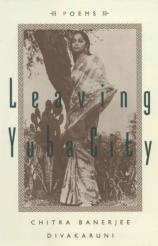Excerpt
Excerpt
Leaving Yuba City

The Walk
Each Sunday evening the nuns took us
for a walk. We climbed carefully
in our patent-leather shoes up hillsides looped
with trails the color of earthworms. Below,
the school fell away, the sad green roofs
of the dormitories, the angled classrooms,
the refectory where we learned to cut
buttered bread into polite squares,
to eat bland stews and puddings. The sharp
metallic thrust of the church spire, small, then smaller,
and around it the town: bazaar, post office, the scab
coated donkeys. Straggle of huts
with hesitant woodfires in the yards. All
at a respectful distance, like the local children we passed,
tattered pants and swollen chilblained fingers
color of the torn sky, color of the Sacred Heart
in the painting of Jesus that hung above our beds
with his chest open.
We were trained not to talk to them,
runny-nosed kids with who-knew-what diseases, not even
to wave back, and of course it was improper
to stare. The nuns walked so fast,
already we were passing the plantation, the shrubs
lined up neatly, the thick glossy green
giving out a faint wild odor like our bodies
in bed after lights-out. Passing the pickers,
hill women with branch-scarred arms, bent
under huge baskets strapped to shoulder and head,
the cords in their thin necks
pulling like wires. Back at school
though Sister Dolores cracked the refectory ruler
down on our knuckles, we could not drink
our tea. It tasted salty as the bitten inside
of the mouth, its brown like the women's necks,
that same tense color.
But now we walk quicker because
it is drizzling. Drops fall on us from pipul leaves
shaped like eyes. We pull on
our grey rainhoods and step in time,
soldiers of Christ squelching through vales of mud.
We are singing, as always on walks,
the nuns leading us with choir-boy voices.
O Kindly Light, and then a song
about the Emerald Isle. Ireland, where they grew up,
these two Sisters not much older
than us. Mountain fog thickens like a cataract
over the sun's pale eye, it is stumbling-dark,
we must take a shortcut through the upper town. The nuns
motion us, faster, faster, an oval blur of hands
in long black sleeves.
Honeysuckle over a gate, lanterns
in front windows. In one, a woman in a blue sari
holds a baby, his fuzzy backlit head
against the curve of her shoulder. Smell of food
in the air, real food, onion pakoras, like our mothers
once made. Rain in our eyes, our mouths. Salt, salt.
A sudden streetlamp lights the nuns' faces, damp,
splotched with red like frostbitten
camellias. It prickles the backs of our throats.
The woman watches, wonder-eyed, as we pass
in our wet, determined shoes, singing
Beautiful Killarney, a long line of girls, all of us
so far from home.
The Geography Lesson
Look, says Sister Seraphina, here is
the earth. And holds up, by its base, the metal globe
dented from that time when Ratna, not looking,
knocked it off its stand and was sent
to Mother Superior. And here
the axis on which it revolves, tilted
around the sun. Like this, the globe a blur now,
land and water sloshed
into one muddy grey with the thick jab
of her finger.
Ratna returned to class with weal-streaked
palms, the left one bleeding slightly. She held it curled
in her lap so it wouldn't
stain her uniform as she wrote out,
one hundred times, I will not damage
school property again.
Now each girl sits with her silent laced shoes
flat on the classroom floor. I grip
my chair-edge. I know, were it not for the Grace
of the Holy Ghost, we would all
be swept off this madly spinning world
into perdition. Sometimes I feel it
at morning mass, six a.m. and the ground
under my knees sliding away, hot press
of air on the eardrum and the blue sleeves
of the Virgin opening
into tunnels.
Ratna didn't cry, so Sister Seraphina
pinned to her chest a placard that said,
in large black letters, WICKED. She
was to wear it till she repented, and no one
could speak to her.
This is the way the moon
travels around the earth, Sister
says, her fist circling the globe, solid,
tight-knuckled, pink nails
clipped back to the skin. I know
the moon, dense stone
suspended in the sky's chest,
which makes flood and madness happen and has
no light of its own. As our heathen souls
unless redeemed by Christ's blood.
That night in the moon-flecked dormitory
we woke to Ratna thrashing around in bed,
calling for Sultan, her dog back home. She
would not quiet when told,
and when the night nun tried
to give her water, she knocked the glass
away with a swollen hand. All
over that floor, shards, glittering
like broken eyes, and against the bed-rail
the flailing sound of her bones. Until they took her
somewhere downstairs.
On this chart, points Sister, you see
the major planets of the Solar System.
Copy them carefully into your notebooks. Smudges,
and you'll do them over. I outline
red Mars, ringed Saturn, the far cold gleam
of Uranus, their perfect, captive turning
around a blank center which flames out
like the face of God in dreams. I will my hand
not to shake. We never saw Ratna again, and knew
not to ask.
Tomorrow we will be tested
on the various properties of the heavenly bodies,
their distance, in light years, from the sun.
The Infirmary
I
I'd seen it only in daylight, once each month
when we were sent down
to be dosed with Enos Salts. Regularity,
the Sisters said, was the root of health.
A nun in front and one behind, we filed
across the compound to the low brown building
crouched among jhau trees. And at the door, waiting,
Sister Mary Lourdes, her habit
stiff as pages in a new book, her hard white hands
smelling of carbolic soap.
Mixed with warm water, the Enos
turned a pale yellow, bitter and bubbly,
burning the nose. Like champagne, said Yvonne
whose parents were Goan Christians
and drank. Cheers, dears, she'd say,
the plastic infirmary tumbler raised, breasts thrust out,
one eyebrow lifted, a black-haired
Marilyn Monroe, while we Hindu girls
from bland teetotalling families
watched open-mouthed. Until the day
Sister caught her at it. And made her bend over
and whacked the backs of her thighs
till the ruler left strips of raised flesh.
We watched the silent light
glint on her Bride of Christ wedding band
each time she slashed the air.
II
So it was strange to come to it in dark, alone,
wrapped in a blanket that prickled my skin.
The night nun's name wavered in my brain
like a flame in wind. Her hands
held me too tightly, made me stumble. Or was it
the rippling shift of ground? The air was fire,
then ice, I could not swallow, and were those stars
or yellow bullet holes in the sky? How the veiny shadows
of the jhaus crawled through the infirmary windows
onto the bed where they put me.
I screamed until Sister Mary Lourdes
bent over me with a syringe and then I stopped
because I knew that I was going to die.
III
After the fever had drained away and the pus,
after the swelling in the armpits and the groin
had gone down, long after I was returned
to the dormitory, to the sough of night-breaths
and girls crying out in sleep, I would remember
the ghosts. They came to me
when Sister put out the light and disappeared
into her cubicle. One by one, spirits of girls
who had died in the infirmary, who told me
their diseases, diphtheria or polio, cholera, typhoid,
the whooping cough. I was not afraid. Their
breath was cinnamon-scented, their cool fingers
like rain on my fevered forehead. Does
it hurt? they would whisper, bending
to kiss me, and hush now, though
I was quiet already. Some nights they wore
white, some nights their hands
glimmered like silver in the dark and smelled
of carbolic soap. They would lie with me
like my mother long ago,
their breasts soft against my face. Their fingers
wearing the Bride of Christ bands
stroked my back until I slept.
For a long time after I was well
I thought of them, wept silently
under my blankets, went sweaterless
in the Darjeeling damp to make me sick again.
Longed to tell someone.
But I was afraid of questions,
afraid of Father Malhern with the ripe red wart
on his chin, who came to exorcise the school
the last time a girl talked of spirits.
Afraid for Sister Mary Lourdes. And so
I held to myself that cool darkness,
and rising from it, those hands and mouths and breasts
that like grace had called me back.
Leaving Yuba City
- paperback: 114 pages
- Publisher: Anchor
- ISBN-10: 0385488548
- ISBN-13: 9780385488549




